Testimonies of the Armenian Genocide Survivors (Part 1)

"Armedia" Information, Analytical Agency introduces true stories collected by joint efforts of "European Integration" Non-Governmental Organization and "Armedia" IAA with the support of the Foreign and Commonwealth Office of the
The project aims at contributing to the development of dialogue and trust-building between the Armenian and Turkish societies.
The stories have also been published in the form of a book called "100 Years…True Stories" and are available in Armenian, English and Turkish.
"The Turkish Baker Kept My Grandfather at His House, Then Gave to the American Orphanage in Istanbul"
Tells Grigor Avetisyan
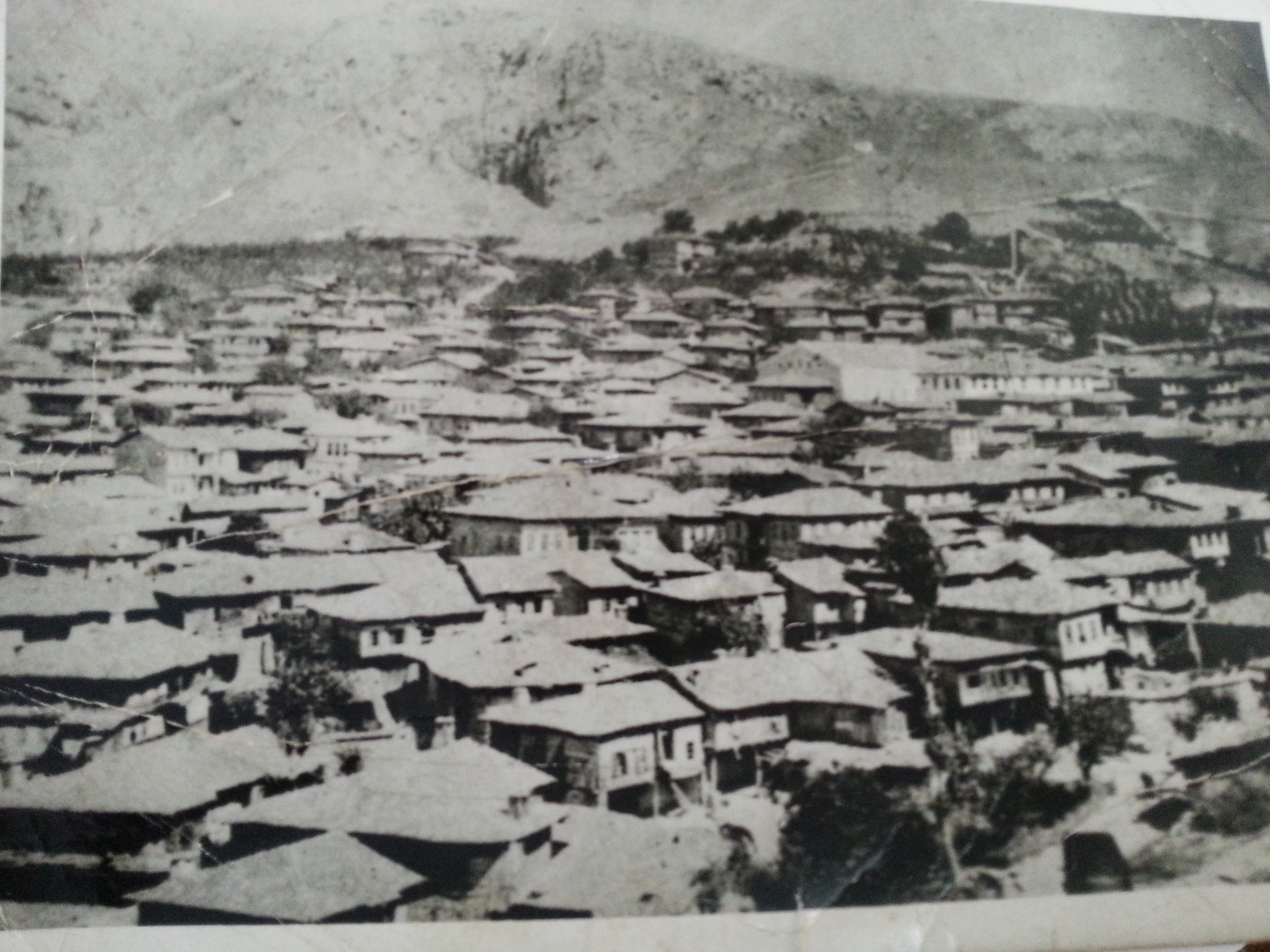
My fraternal Grandfather Avetis Avetisyan was born in 1915 in the village of Muratchay (Muradchay) in Eskişehir district. The name of the village has been changed; I don’t know what it is called now. At that time the village had about ten thousand population who were mainly involved in cattle breeding. There were two churches in Muratchay: one was built before 1900, the second one was built and began to operate in 1900. My Father worked at that new church as a ringer, unlike Eastern Armenia, churches in Western Armenia didn’t have belfries, instead teenagers from the village announced about the liturgy and Divine worship around the village by ringing a bell.
My Grandfather’s grandfather (Grand-grand-grandfather) Avet of the Hajvetants had made friends with the family of a Turkish baker in Eskişehir when taking cattle to sell there. In 1914 Avet of the Hajvetants brought his grandson – my grandfather to the baker as a pupil.
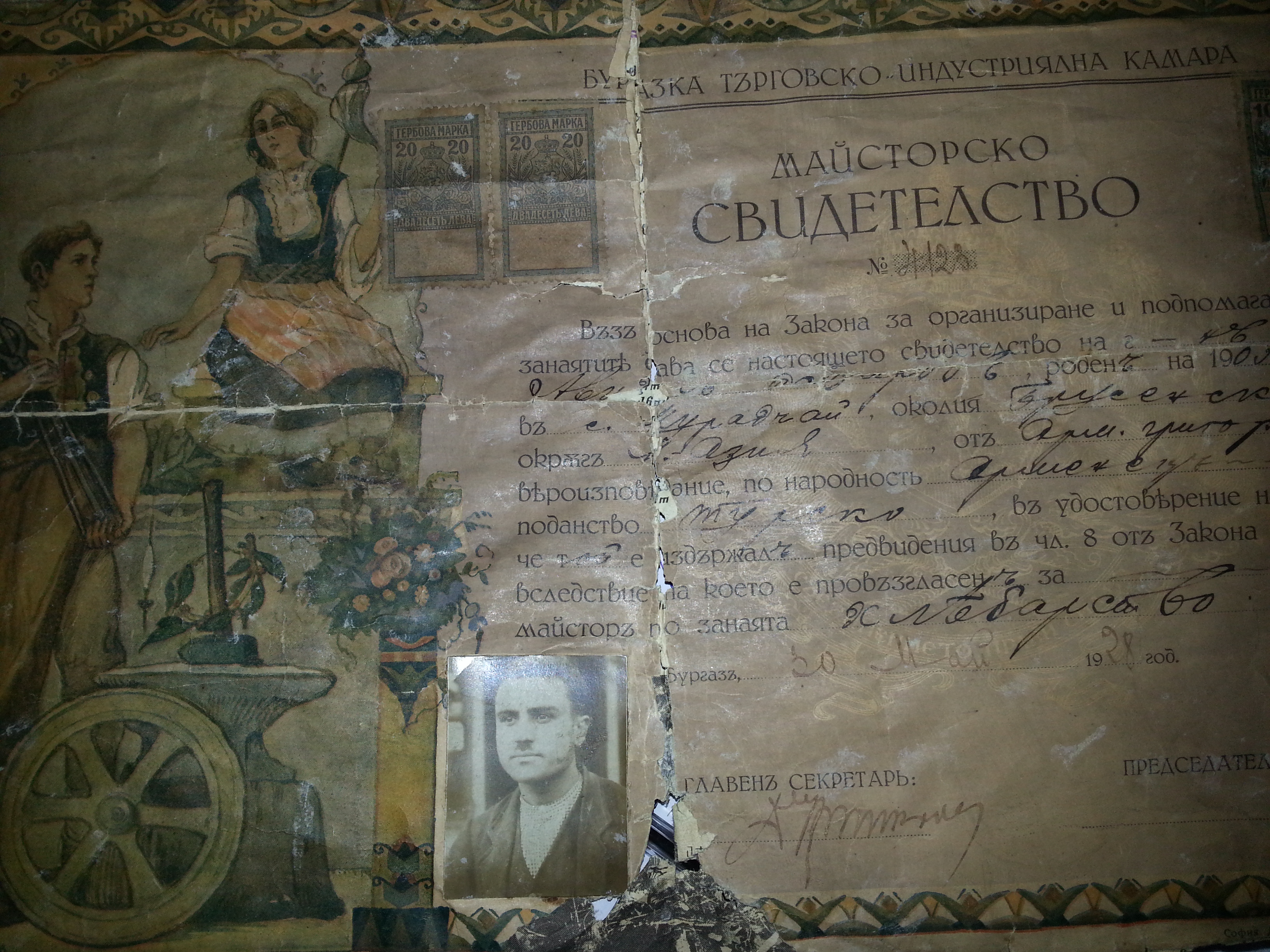 When mass massacres and deportations of Armenians started my Grandfather was at that Turk’s house. In 1915 that Turk actually saved my Grandfather from the carnage by keeping him at his house and hiding from everyone that he was an Armenian. Later my Grandfather was taken to an American orphanage. Grandfather said when that tense period had already passed and there was an opportunity to return he immediately decided to go back to their village and find his parents. Returning there Grandfather found his native Muratchay ultimately destroyed, plundered and his relatives – assassinated. Seeing all that, Grandfather went and joined the Greek army as a soldier. In his words mainly Armenian forces fought in the front lines of the Greek army and the Greeks followed them. After the Greek army was defeated my Grandfather moved to Bulgaria and settled in the town Stara Zagora where he met my Grandmother and they got married. During the years in Bulgaria Grandfather earned their living as a baker: he worked as a baker for a Turk. Later, grandfather was able to buy a house; he also bought that Turk’s bakery. They lived in Bulgaria until 1933 and in 1933 they moved to Armenia with their two sons.
When mass massacres and deportations of Armenians started my Grandfather was at that Turk’s house. In 1915 that Turk actually saved my Grandfather from the carnage by keeping him at his house and hiding from everyone that he was an Armenian. Later my Grandfather was taken to an American orphanage. Grandfather said when that tense period had already passed and there was an opportunity to return he immediately decided to go back to their village and find his parents. Returning there Grandfather found his native Muratchay ultimately destroyed, plundered and his relatives – assassinated. Seeing all that, Grandfather went and joined the Greek army as a soldier. In his words mainly Armenian forces fought in the front lines of the Greek army and the Greeks followed them. After the Greek army was defeated my Grandfather moved to Bulgaria and settled in the town Stara Zagora where he met my Grandmother and they got married. During the years in Bulgaria Grandfather earned their living as a baker: he worked as a baker for a Turk. Later, grandfather was able to buy a house; he also bought that Turk’s bakery. They lived in Bulgaria until 1933 and in 1933 they moved to Armenia with their two sons.
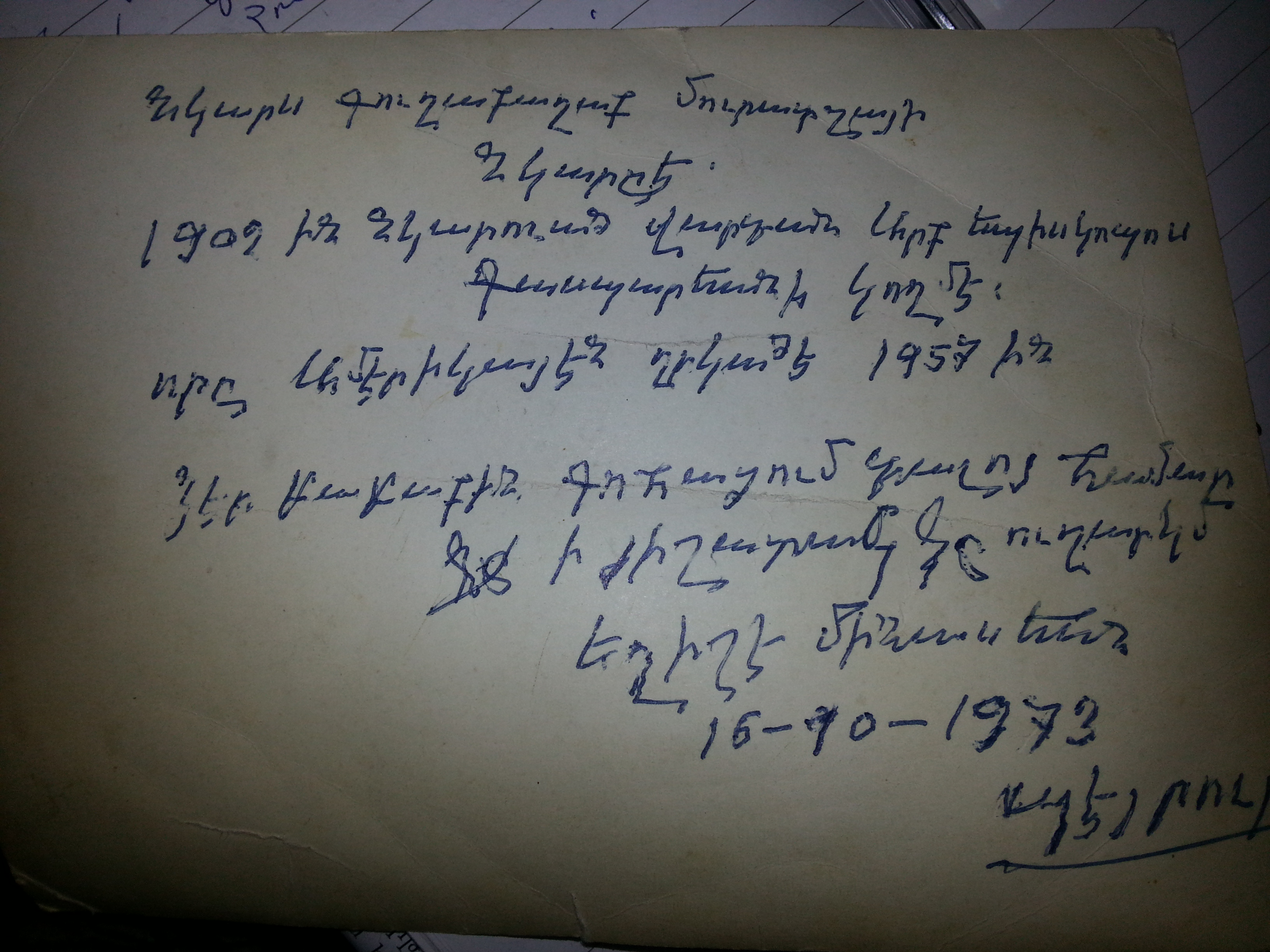 Once I asked my Grandfather what that house and bakery he had left in Bulgaria and returned to Armenia would cost. Grandfather answered, "Oh, even if it cost one million." And in answer to my question why he left all that and returned to Armenia he said, "I came here and found nine million..." And he started counting his nine grandchildren who spoke Armenian in Armenia and grew up as Armenians.
Once I asked my Grandfather what that house and bakery he had left in Bulgaria and returned to Armenia would cost. Grandfather answered, "Oh, even if it cost one million." And in answer to my question why he left all that and returned to Armenia he said, "I came here and found nine million..." And he started counting his nine grandchildren who spoke Armenian in Armenia and grew up as Armenians.
Grandfather often told about his story of surviving the Genocide, about the hard years following it and about the calamities. Talking about Turks he often repeated he had taken all his revenge. He used to say, "You have nothing to do." Now I can understand he said so because he didn’t want me to live a life full of revenge; he wanted me to live a calm life. Keeping the past bright in his memory, overcoming so many difficulties my Grandfather passed away in 1977.
"I Remember the Good as Well as the Evil"
Tells Rima Petrosyan
My Father Sirekan Pertosyan was from historical Iğdir, Western Armenia. He deported in 1914.
 My Father and aunts told me about the Genocide. My Aunt told that before fleeing they hid a jug full of gold in their yard, left it there and came. She used to say that upon hearing the news they hurried away and didn’t have time to take anything with them. She said crying that they hid the jug in the hope they would return. My brother often asked her about whereabouts and shape of their house in the hope that he would manage to go there and find the gold and everything else.
My Father and aunts told me about the Genocide. My Aunt told that before fleeing they hid a jug full of gold in their yard, left it there and came. She used to say that upon hearing the news they hurried away and didn’t have time to take anything with them. She said crying that they hid the jug in the hope they would return. My brother often asked her about whereabouts and shape of their house in the hope that he would manage to go there and find the gold and everything else.
Both of my aunts, one of whom died in 1965 and the other in 1985, lived on the bank of the Araz River and their descendants still live there. When I was young and visited them I often asked why they had come and settled there after the Genocide if everyone else went to foreign countries. In answer my aunt used to stretch her hand in the direction of their garden and showing a bit farther she said they lived there so that they were able to return to their home as soon as the border opened.
Father told there were three sons and three daughters in the family…
At that time Armenians and Turks used to live side by side. They were very close with their neighbor. They were friends, shared food and worked together… |One day my Father got rather surprised when that very friend told him that a massacre of Armenians was to be organized and they had to escape. So my Father warned all Armenians he could. Going from one house to another my Father was able to save so many people. Together with his brother and sisters he crossed the Araz and settled there. My aunts lived there until they died and my Father came to Yerevan. When telling this story Father always noted that if it hadn’t been for that Turkish friend of his they would have been assassinated just like others.
In Yerevan Father got married and had two children. Before that he had been married to another woman who died before the deportation. Father had two children from that woman also. They were raised and brought up by my Mother and we didn’t know they were not my Mother’s children for quite a long time.
Father always said that it is not the Turkish people to be blamed. Pashas should be tried…
I remember the good as well as the evil.
"Turks Brought Gyulizar up as Their Own Child and Refused to Give Her to Americans"
Tells Romela Gulyants
I am Romela Gulyants and I have heard this story from my Godfather. During family gatherings he often told about his Grandmother Gyulizar Smbulyan who was born in 1899 in the village of Gemerek, Sebastia. Her father was a middle provincial official and there were three children in the family: the elder daughter, Gyulizar and her brother.
My Godfather told that during the slaughter horsemen came to the village, caught Gyulizar’s father and took him away from home. A few days later her mother was killed. Thus the children became orphans with no one nearby. Some days later, when another attack occurred on the village, one of the Turkish horsemen kidnapped Gyulizar’s brother whom she never saw again and another horseman kidnapped Gylizar herself. She had no idea what happened to her elder sister.
In my Godfather’s words the Turk kidnapping Gyulizar took her to his house and, as the family didn’t have children for many years, Gyulizar was accepted and treated like their own child and the family even had no wish to give her to an orphanage.
A few years later a boy was born in that Turk’s family and they often noted that the Armenian girl was a gift for the family and had brought Holy Spirit with her that was why they had a child.
"Gyulizar is a child with ghsmat [good luck, tr.]," my Godfather used to cite the Turk’s words.
Five years after moving to the Turk’s house people from the American embassy arrived searching for Armenian children surviving the Genocide. An Armenian woman who worked at a Turk’s house and knew the Smbulyans’ daughter informed the embassy officials about Gyulizar. A few days later they seized Gyulizar at night as the Turkish family refused to hand the child to the Americans’ care.
The next day the Turkish family went to the embassy and begged to return the child. The Americans sharply refused but gave them an opportunity to see Gyulizar for some few hours.
During that meeting the Turk gave the child some money and his address and asked her to return home whenever she wanted. Godfather told that Gyulizar kept that Turk’s address for many years.
The American embassy moved the child from Turkey to Greece, to the orphanage of Edipsos where she studied and got married. Her mother-in-law was Andranik Ozanyan’s cousin, paternal aunt’s daughter, who was looking for a bride for her younger son Hovsep. After getting married Gyulizar changed her name and took Armenian name Hasmik [Jasmine, tr.]. A year later Hasmik and Hovsep had their first child Grigor. In 1936 they moved to Yerevan where their second son Armenak was born. In Yerevan they lived quite a prosperous life but that period coincided with Stalin repressions and the family, fearing exile and persecutions, sold all their property and migrated to Tabriz. After her father-in-law’s death they moved to Salonika, Greece. In Greece Hovsep suddenly died and all the burden of the care about the family lay on Hasmik.
Seeing that Hasmik was working too hard and was suffering her mother-in-law decided to marry Hasmik. Thus Hasmik married an Armenian gardener who had also survived the Genocide and lived in that same city but never wanted to talk about what had happened during those years. As my Godfather told the man had a scar on his face left by a Turk who did that to show the boy was dead so that he had an opportunity to take him away from the attacked village. Hasmik lived a life full of hardships with her second husband and had to move to the country after her third son Hakob’s birth to be able to earn the living for the family. While she was pregnant Hasmik got blind and remained so for some 5-6 months. Fortunately, though, her eyesight restored after the child was born.
Then her elder sons moved to Germany to work and support the family. A few months later Hasmik and her husband also moved to Germany to their children. However, this period coincided with the Second World War and they had to move to Greece again where they lived in rather hard conditions. At first they lived in the shattered hut of a neighbor of theirs. After some time they bought a sewing machine and her husband learnt to make ice-cream. So they began to "rise". Then Hasmik’s husband’s brother who lived in Bulgaria decided to move to Armenia. Hasmik’s family also decided to settle in Armenia with them (1947). In Armenia Hasmik’s husband began to work at a furniture-making factory. The family lived in Arabkir district. Her sons and their descendants still live in Avan district, Yerevan.
Hasmik lived 107 years and died in 2006.
"The Turkish Officer Said the Turkish Government Had Decided to Exterminated All Armenians Living in Turkey"
Tells Levon Kaftaryan
(The recording was provided by his cousin Madlen Minasyan)
My Father came from Agn. He did trade and had 4-5 shops. Father told that on an early morning, when he opened his shop, he saw a military officer who stopped his horse in front of the shop. It was a Turkish officer. He handed a damaged silver coin and said, "Chorbashi, [bashi means merchant in Turkish, tr.], could you change this coin?" father took a new silver coin out of the chest and gave to the officer as a gift, without taking his money. The officer thanked and went away.
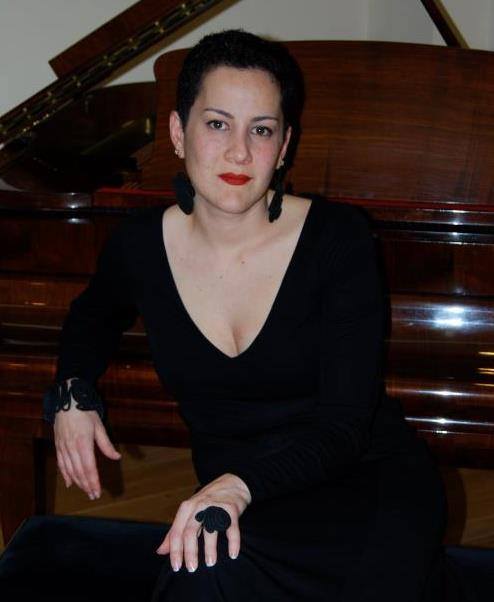 Two years later, in 1892 massacres of Armenians started. One morning a signal was given from a minaret and slaughter began. Father told he suddenly saw a few military officers beside their door. The mob passed by smashing everything, robbing shops. When they got to our door the soldiers said, "We have no right to rob this place." And the mob went by.
Two years later, in 1892 massacres of Armenians started. One morning a signal was given from a minaret and slaughter began. Father told he suddenly saw a few military officers beside their door. The mob passed by smashing everything, robbing shops. When they got to our door the soldiers said, "We have no right to rob this place." And the mob went by.
In the evening the attack ceased. My Father told that an officer came in and said, "Good morning, chorbashi. Do you know why you are free?" Father asked, "Why?" and he answered, "Do you remember you gave me a silver coin as a gift and I didn’t forget that? Two years later I came to free you and your family."
The officer said that the Turkish government had decided to exterminate all Armenians living throughout the empire. He also said as my Father was a kind man and had done so much good for the city, they had made a decision with the intendant and the mayor to offer him to leave taking all his relatives with him.
My Father said his four brothers lived in different cities – Diarbekir, Malatia – and asked what would happen to them. The officer said they would be ordered to arrive there immediately.
Everybody gathered together. About ten gendarmes took the whole family on horses, on foot to the Black Sea. There they got aboard a ship and headed for Russia. That is how they got to the city of Sukhumi. There they were free.
During the Russian revolution my Father moved to Bulgaria. There again he was involved in trade: he was well-known Gyulbenkyan’s salesclerk. I was born in Varna, Bulgaria in 1905.
"Until the End of His Life My Father Remembered Zabit Effendi"
Tells Hakob Margaryan
Our genuine family name is Malkhasyan, however, destiny made us Margaryan.
My Father Harutyun Margaryan was born in the town of Evciler, Van in 1899. His father Vardan was a superintendent when the construction of Berlin-Baghdad railway began. Employees of various nationalities were engaged there – Armenians, Greeks, Turks, Kurds, Arabs. When they received their wages they brought and gave the money to Grandmother Varduhý to hide it. She recorded everybody’s names in the list and put the money in a chest.
When the carnage of 1915 began my Grandfather Vardan was among the first. He was one of the first victims. But he had a good friend Zabit Effendi who collected the whole family and kept in his house for about 4-5 years. There were my Grandmother, my Father, his elder brother Mihran born in 1895, Hayk (1898) and their sister Aghavní.
They lived with the Turk’s family, worked with them. That man never put any difference between his sons and my Father or uncles… He always fed and dressed them the same way…
Elder brother Mihran worked at the casino in that town.
In 1918 Mihran was recruited to the army, there his Turkish commander said, "Take my wife and child to Polis. From there run away, go wherever you want, just never ever come back again."
Mihran took the commander's family to Polis. In the harbour there stood a Bulgarian ship. He went up and said he was an Armenian and wanted to run away from there. He was taken aboard. This is how he appeared in Greece.
When the second wave of massacres began Zabit Effendi said, "I can no longer keep you here, you must leave this place." He filled saddlebags with food and everything necessary for the journey and my Grandmother set off with her children.
The Turk’s son had argued with my Father. Well, perhaps he didn’t like his father treating Armenians so well. But, when saying farewell, he came up to my Father and said, "Don’t remember the bad about me."
So they arrived in the town of Dersim in Cilicia (Kilikia). Various events happened on the way but they got there without any losses.
My uncle Mihran’s fiancée Yepraksia was with them. During the journey she caught smallpox, which was rather dangerous for the surroundings. She was isolated. But my Father gave the Italian doctor some money to get the girl out of the hospital. So she was taken out of the hospital, hidden among dead bodies and was brought home. Every day the doctor was given one gold coin to come and cure the girl at home. And Yepraksia survived.
After all they got to Dersim. The port was covered in dead bodies; people walked over them. They went to get aboard the ship. There were so many people that hot water was poured on them from the ship to keep them away. A thick rope was thrown from the ship into the crowd. Those who appeared on one side of it got on the ship; those on the other side had to remain on the shore. Somehow, with great difficulty the family managed to get aboard the ship.
Suddenly among all that fuss they noticed their small wooden box was missing. You may remember, perhaps, shoe shiners used to have such boxes. The family had been earning money during the whole journey and saving it in the secret part of the box. Hayk noticed the box floating in the water. He jumped into the water and climbed back with the box in his hand.
At first they were on Zakynthos Island. After the slaughters, when Armenians were scattering they used to leave some information about themselves in Armenian churches saying "We are at a certain place". This way many people managed to find each other.
Mihran’s fiancée Yepraksia left a message at the church saying, "We are on Zakynthos Island." And on a nice day the door opened and Mihran entered the house.
There were many refugees there. One day my Father was told there were some very beautiful girls. Father went and saw my Grandmother Srbuhí who was 16 then. Father said, "Let’s go, I’ll show you some very interesting things." He took her to his house and didn’t allow her to go back. Soon they got married and moved to Athens. That was 1926. Here they started a shoemaking workshop, then a store. Once my Father got drunk at an inn and had an argument with a Greek. That man said, "Get lost, go to your country, what are you doing here?" Father hit the Greek. He spent about eight months in prison for that. When he got out he decided that it was really time to go to Armenia. By the way, my Father was a bearer of a Nansen’s passport.
They went to the port. There, names from a list were read out and only then people were allowed to get on the ship. The name "Margaryan" was read out, no one responded. It was read again. Again there was no answer. Then my Father said, "We are Margaryan". Their whole family embarked the ship and came to the Caucasus. It was 1932. This is how our family name became Margaryan from Malkhasyan.
My Father remembered Zabit Effendi till the end of his life. He used to cross himself and say, "God bless him…"
"Hair of Armenian Women and Girls Were Flying Like Seaweed on the Waves"
Tells Naira Mkrtchyan
I will tell you the story of my maternal Grandfather Sargis (Sergo) G(K)uyumjyan.
The name of my Sergo Grandfather’s Father was Grigor (1876-1948), his Mother’s name was Gayané (1877-1959) who was called Néné. Their children were Sargis, Manuk, Varduhý, and Srbuhý. They lived in the city of Izmir. Grigor and his father were famous engineers-mechanics, and his grandfather was a jeweler. And that is where their family name comes from: "kuinjý" means "jeweler" in Turkish. It is said that the famous painter of the 19th century Arhip Kuindzi was from their dynasty.
I was able to restore the story of the family salvation when I started to remember my Mother Gayané Guyumjyan's and Uncle Grigor Kuyumjyan's (Manuk's son) stories that they had heard from their Grandfather Grigor.
"That day our neighbor, who was half Turkish and half a Muslim Caucasian nationality, visited us. He was an officer of the Turkish army. He came and said that we had to pack and flee immediately as massacres were expected. We got ready very fast: we took blankets to cover ourselves, food, the money we had at home and fled. We had no time to get the hidden gold.
All members in our family, especially the girls were very beautiful and were white-skinned, red-haired and hazel-eyed. That Turkish neighbor said, "I can't allow such beautiful people to be killed." Following his advice we put some soot on the girls' faces and left. That Turk took us to the Greek army on donkeys. There were gendarmes on every meter on the road leading to the harbour. I gave a gold coin to each of them; I had put gold coins in different pockets. Thus we managed to get to the ship and left for Greece. That is how our family found rescue.
The Genocide was raging in Izmir with planned and unspeakable violence but we were able to flee just in time thanks to that Turkish neighbor. Much later we were told that when that Turk returned and it was found out that he had helped us, he and all his family were slaughtered."
My Mother told that her Grandmother Néné remembered and blessed that Turk every evening before going to bed. Néné also told that from the Greek ship she had seen how Armenians were beheaded and had seen how too many bodies were floating in the sea, how "beautiful, long hair of Armenian women and girls were flying like seaweed on the waves". She was very impressed by that scene and always wept when she remembered it.
The Guyumjyans lived in Athens until 1932. Grigor worked at the Central Bank doing something in the service of safety deposit boxes. He was famed not only for being a very good specialist with "golden hands", but also as a kind and honest person. Once he saw a safe in the yard and asked why it wasn't in use. A bank employee answered it had been there for a long time as nobody was able to open its secret lock. Grigor assumed the task to try to open it. After cramming at it for a few days the safe opened. Grigor fell unconscious when he saw what was inside it: money, jewelry and gems. Master Grigor handed all the findings to the bank. All newspapers of Athens wrote about that.
In 1932 the Guyumjyans moved to Yerevan, Armenia. Sargis Guyumjyan was an honored innovator of the Armenian SSR, the Chief Mechanic of the Confectionery and Candy Factory, a Hero of Socialist Labor, a member of the Association of Innovators and Inventors of the USSR. Granddad Sergo was called "chocolate grandfather" in the neighborhood as he always used to have sweets for kids.
The family lived not far from the railway station, by the river on Hoktemberyan avenue (currently Tigran Mets). There was a railway bridge nearby.
One day Sergo heard the sound of alarming siren of the locomotive. When he came out of the house he saw the train had stopped on the bridge and was blowing out black smoke. People were in panic and the machinist was running away leaving the train there. Sergo and his brother Manuk took their instruments and ran to the locomotive. They were hardly able to open the incandescent steam boiler and the steam blew out in a mighty stream. If they had been a little late it could have blown up causing several human losses.
"Realizing What Destiny Awaited Imprisoned Armenians, Turkish Neighbors Helped Them Run Away"
Tells Anahit Partizpanyan
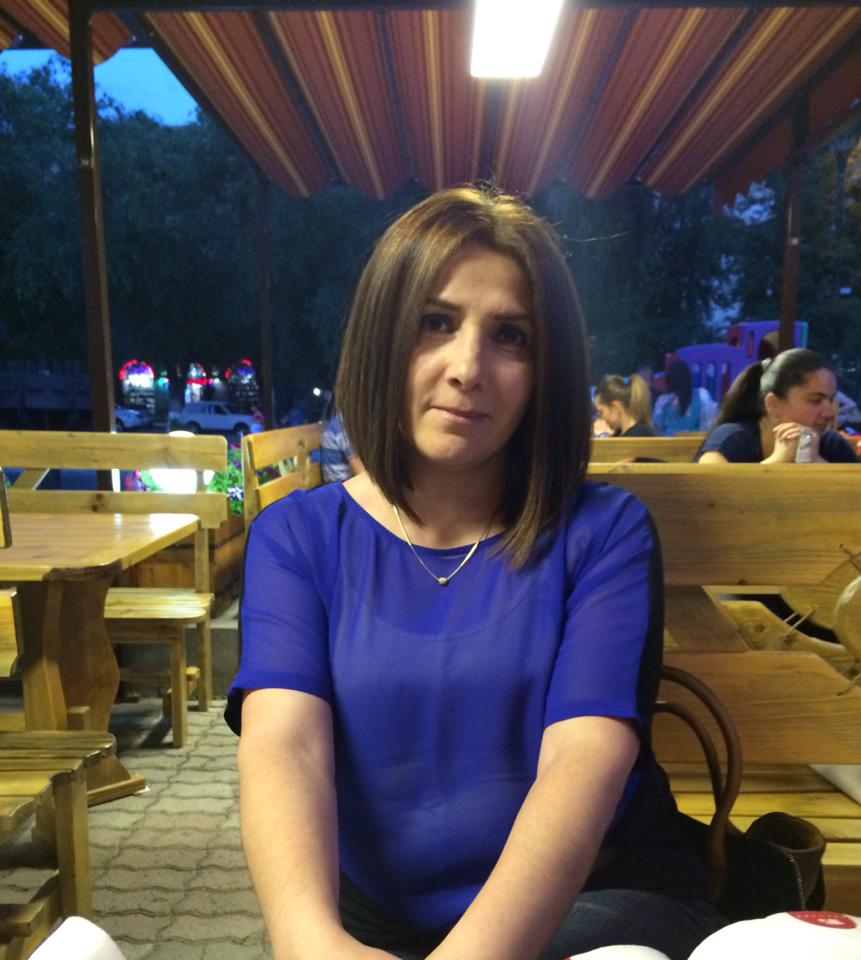 When I was born my Grandfather had already died, that is why, unfortunately, I didn’t hear Grandfather’s reminiscences. I saw only my Grandmother Arshaluys Qanqanyan. Grandmother often told about Western Armenia. She said they lived a convenient life, had nice houses, yet had to migrate.
When I was born my Grandfather had already died, that is why, unfortunately, I didn’t hear Grandfather’s reminiscences. I saw only my Grandmother Arshaluys Qanqanyan. Grandmother often told about Western Armenia. She said they lived a convenient life, had nice houses, yet had to migrate.
Although she was very young during the deportation, only 14, she always spoke about their house, the beauty of the nature in their motherland with great affection and positive impressions. At that time my Grandfather Manvel Partizpanyan was 20. He came from the city of Van. As far as I can judge, Armenians lived quite well there, they even kept servants at home and were very wealthy. Yet, they were able to take hardly anything with them during the expatriation. When I was still at school, I remember, my Grandmother used to tell me that they hid quite a fortune in the walls of their house; no one thought they were leaving for ever; people hoped one day they were going to come back to their homes.
Grandmother told us that their Turkish neighbors had saved them; she said if it hadn’t been for them perhaps we wouldn’t be alive as well. During the deportation quite a big group became prisoners. All Armenians were collected and locked somewhere. It is interesting that local Turk neighbors came to their rescue. Seeing the destiny of captive Armenians and realizing none of the prisoners usually managed to survive, they helped not only my Grandmother’s family but also the whole group to escape.
Grandmother told that they were in very good relations with their Turkish neighbors. She told that they lived side by side and treated each other very warmly.
She also told that Silva Kaputikyan’s mother was among the captives of their group.
Meanwhile, there was another significant factor: the Turkish servants of Grandmother’s family were so loyal that upon hearing about the planned massacre against Armenians came and warned them to run away.
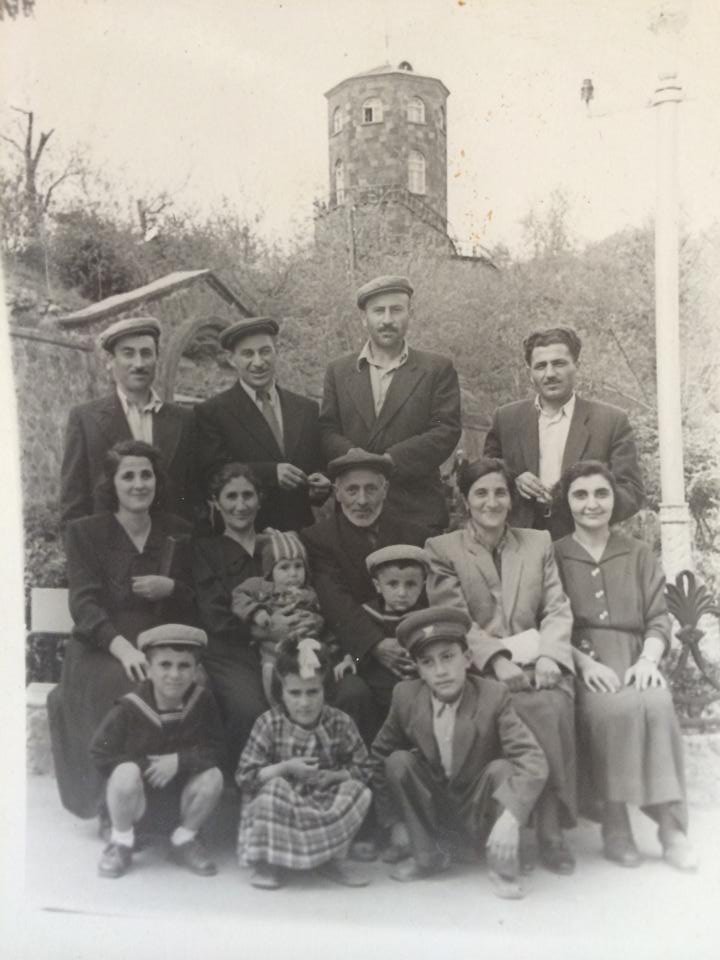 However, my Grandmother also remembered the horrors of the massacre: how pregnant women were stabbed with swords before their eyes; how men were beheaded; how young girls were raped. She said Armenian girls jumped into the lake thus preferring to die than to get into the enemy’s hands.
However, my Grandmother also remembered the horrors of the massacre: how pregnant women were stabbed with swords before their eyes; how men were beheaded; how young girls were raped. She said Armenian girls jumped into the lake thus preferring to die than to get into the enemy’s hands.
At those times girls got married quite young – at the age of 13-14. Grandmother also married at 14. She came to Armenia with my Grandfather and settled in Yerevan. With the money they had brought with them they managed to start their own business and lived in quite good conditions. They had three sons.
… They had that never-ending longing for their motherland and suffered. Grandmother was fond of gathering her grandchildren around and telling about Western Armenia. Although she was only 14 when they were deported and had been living in Yerevan since then, she spoke Western Armenian till the end of her life. I have heard about the herring of Lake Van, about the water, the air of the Van so often. And, although they lived quite well in Yerevan, she always spoke about their houses they had left with nostalgia. They had a big family but were never able to find out the fate of their relatives. Grandmother always said, "When the roads are open I’ll go and find my house." But it was even hopeless to think about it at that time. She was a very intelligent woman and constantly read: she was 85 when she died but even at that age she used to read without glasses.
We are still trying to find our relatives. It is much easier to do that now thanks to modern technologies. Our family name is unique – Partizpanyan and we know that all bearers of that name come from Western Armenia. Many of them get in contact with us and we try to find out if we are relatives.
My Grandfather Hoped That One Day His Family Would Return Home Again
Tells Gayané Petrosyan
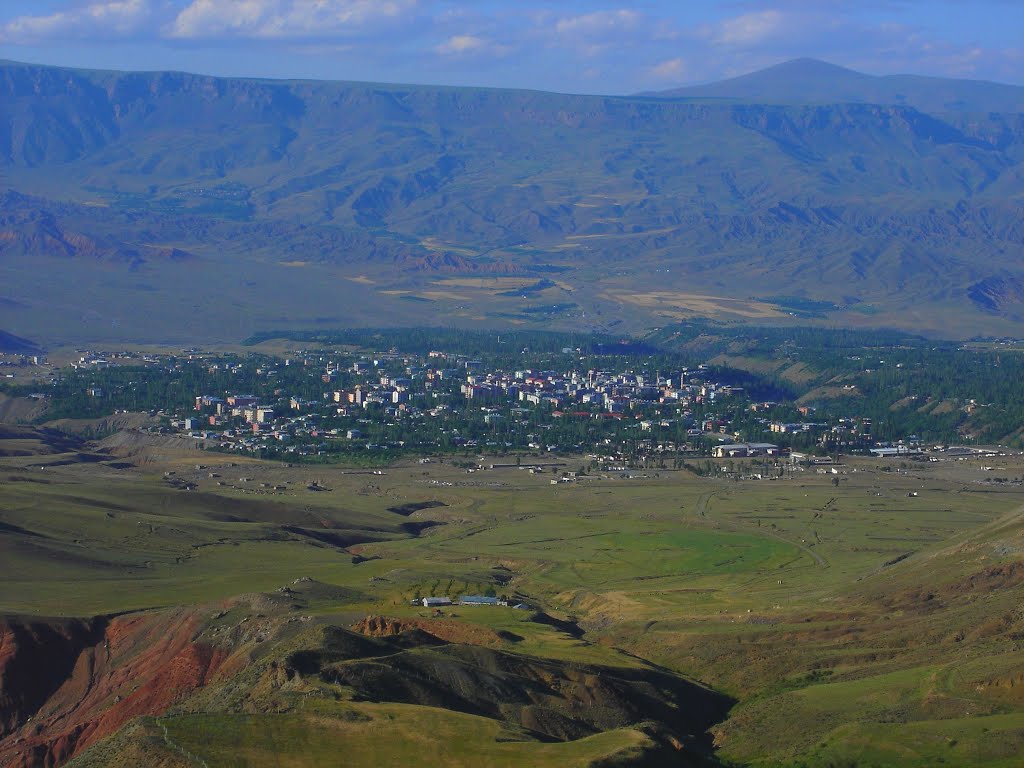 When I was young, I wondered, how my Grandmother Vardanush chose her sons’ unusual names, but when I grew up, and my Grandmother, father and uncles told me Grandfather Samson’s family story, I understood, that they were not names chosen randomly, moreover they had their sad story.
When I was young, I wondered, how my Grandmother Vardanush chose her sons’ unusual names, but when I grew up, and my Grandmother, father and uncles told me Grandfather Samson’s family story, I understood, that they were not names chosen randomly, moreover they had their sad story.
Samson Petrosyan was my father Vardan's father, who lived in Kaghzvan town. My Grandfather's father, who was very often called Tiracu [Deacon, tr.] Petros, was a very respected, well-known and rich person in Kaghzvan.
It was 1915, the days of the Armenian Genocide. Grandfather Samson came home and not finding his family there, remembered his father’s words: "If you come home from faraway and find the door of our house closed, you should go and dig under the nut tree. If you find our gold there, it means we have escaped and have left our village". My Grandfather dug under the nut tree and seeing the gold in a jug, started crying. After a while he again covered it with soil hoping that one day everyone would return home.
In the days of the Genocide Turkish janissaries organized a special muster as if to take Armenian young men to the army, but in reality they threw the boys into prison, so that they could not help their families during the massacres. In the prison Turks read out everyone’s names and family names, called them out in turn and killed them. One day the commander of the janissaries ordered one of them to behead "that Gyavur", to imbrue his clothes into his own blood and give them to the commander.
The janissary took my Grandfather to a lonely place to kill. To say goodbye to his land for the last time my Grandfather bent and put some soil into his mouth. Just at the moment, when my Grandfather was bending, it seemed to the janissary that this person’s back was very familiar to him. He asked my Grandfather where he came from and learning that he was Samson, Tiracu Petros’ son from Kaghzvan, embraced my Grandfather and told him that he had served in my Grandfather’s home and that his father, Petros, had saved their family from hunger. The janissary reminded my Grandfather that his name was Ali, and he used to take my Grandfather for walks on his shoulders when the latter was still a little boy. Thus Ali didn’t kill my Grandfather. He waited till it became dark, then he took my Grandfather to his house, killed a caw, imbrued my Grandfather’s clothes into the blood and gave them to his commander.
The Turk janissary treated my Grandfather like his own son. He gave him his son’s clothes who had died of an illness. Ali kept my Grandfather Samson for several months at his home in secret. However, all that time my Grandfather asked Ali to send him to Armenia.
Ali’s dead son had been married and his widow was living in Ali’s house. My Grandfather told my Father, that this woman was incredibly beautiful and Ali constantly tried to persuade Grandfather Samson to marry her and become his son, but my Grandfather refused his request every time.
When Ali tried to persuade him again, my Grandfather had enough courage to say: "If you want, you can kill me right here, but I will not marry a Turkish woman." Ali at last understood that it was useless to persuade Samson and at night helped him cross the border.
At last my Grandfather came to Ejmiatsin, where he came across his uncle Minas, with whom, wandering here and there passed his nights. Realizing that they could not go on like that, uncle Minas persuaded Samson to leave Ejmiatsin and to find some job in nearby villages. Grandfather Samson wandered for a long time and at last came to the village called Kosh (in the past called Kvashavan), where he settled down, built his house and formed his family.
"When the Turkish Soldier was Ordered to Shoot at Armenian Refugees, He Fired into the Air"
Tells Tatevik Grigoryan
My Mother’s Grandmother Gayane Diatyan was the only long-liver in our family. She died in 2004 at the age of 93. Naturally, each of us deferred her. Unfortunately, I was only 14 when she died and couldn’t understand the depth of so many things. Now, when I look back, I can realize she wasn’t somebody ordinary; she was a person of a unique fate and upon whose fate the Genocide had left its impact.
My Mother’s Grandmother’s parents – Arusiak and Hmayak Daityan – lived in Kars with their two daughters. I have heard they were quite wealthy in Kars; I guess they were involved in trade. My Grandmother’s mother Gayané was rather young during the Genocide – only four, and her sister Nazik, as far as I have heard was very beautiful and was always hidden from Turks.
It is most interesting that, despite all the violence and ruthlessness known to us, this story has some emotional side… On the way of deportation from Kars (I don’t know the details or circumstances), when a Turkish soldier was ordered to shoot at the refugees he fired all the bullets into the air… I clearly remember my Grandmother Gayané always told about this with wet eyes.
Later, the family continued the way of deportation and settled in Javakhq (Javakheti). She became an Armenian language teacher and lived a life full of hardships.
Certainly, one cannot help remembering this story, the positive cannot be disguised. However, the consequences of the massacres are greater. A bright example of that is the story of my Grandfather Melik Hovhannisyan who came from Lower Karabkh. In 1918 Turks killed his parents before his eyes and he managed to cross the Alazan River with his blind Grandfather. Then he lost his Grandfather also and remain an orphan… the Genocide had changed the way of all his life.
I am the fourth generation of the witness survivors of the Genocide. I have known since childhood that my Grandmother’s both parents have some interesting stories and the Genocide topic has always mattered to me. That is why I have been involved in collecting stories of the Genocide survivors as a journalist. Each story comprises certain emotiveness and great sorrow. And it is very interesting that the Genocide survivors always maintain their aspiration to return to their motherland; the house they left in Kars, Musaler is the best for them…
* Tatevik Grigoryan’s story was also published on the website of "Armenpress" Information News Agency.
"Warning by Turkish Servants Saved the Zrvandyans’ Lives"
Tells Anna Hakhverdyan
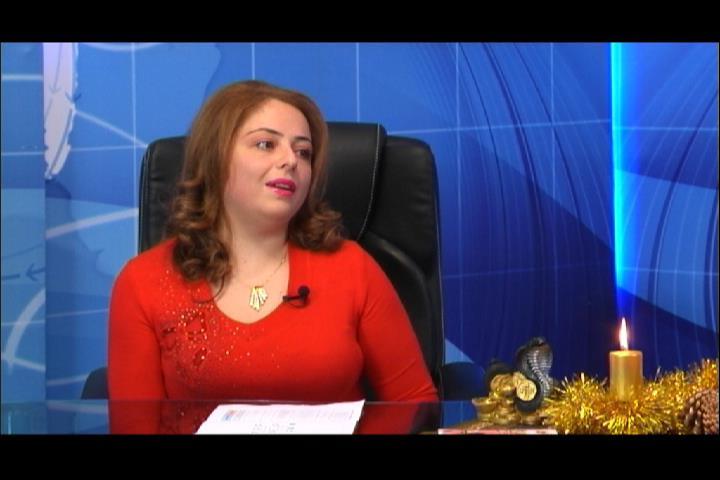
I will tell you the story of my Grand-gradnfather’s family the Zrvandyans. They lived in Van and were active participants of the defense actions in the city. My Mother’s Grandfather Tigran Zrvandyan was married to Arshaluis Erjyan. The Zrvandyans were a revered family in Van; Tigran’s father was a rich merchant and also a councilor to the mayor. He usually accepted foreign delegations. The Zrvandyans had a three-storey mansion in one of central streets of Van and had servants among whom there were Turks.
And it were these Turkish servants that warned the Zrvandyans about upcoming massacres although there was already certain unrest in Van. Tigran migrated to Eastern Armenia in 1914 with his wife Arshaluis and three children. Tigran’s parents, who were already quite elderly people then, refused to leave Van. They remained in the city and participated in the defense of the city. They were killed during a self-defense battle.
Tigran and his family suffered many hardships on the roads of refuge. They had taken only things of first necessity and gold. They were able to live on that during the first period. They also lost their children on the way. My Mother’s Father was born in Eastern Armenian in 1918, four years after settling here.
Other materials on this subject
- FM of Luxembourg Visited Armenian Genocide Memorial Asselborn has arrived in Armenia for an official visit at the invitation of Armenian Foreign Minister Edward Nalbandian. He will have meetings with Armenia’s President Serzh Sargsyan and will visit the...
- An Armenian Living in Turkey: The Events of 1915 Cannot Be Forgotten What refers to the future, then I hope that the Armenians and Turks will reconcile in the end. The problem is between the governments and they must resolve it
- Armenian Living in Turkey: Advocacy for Brotherhood Should Be Done at the State Level to Sound More Convincing The country already has problems connected with human rights and freedom of expression, which for Armenians are doubled.
- French Senate Will Discuss Bill Criminalizing Armenian Genocide Denial in Early October "We work in order the required number of MPs to vote for the bill. You know the Turks are not indifferent, they also work, do everything in order that option not to be adopted."
- Genocide Education Bill in the US State Michigan Signed into Law "I am elated we finally accomplished making this important genocide educational program into Michigan law," Jamian said. "This success demonstrates that when our community leaders all work together we...
-
 17:08
17:08The regular session of the Anti-corruption Policy Council takes place in Jermuk
-
 15:05
15:05The Prime Minister sends congratulatory messages to the supreme leader of Iran and the President of Iran
-
 11:11
11:11Armenia sends earthquake aid to Turkey
-
 10:43
10:43Commemoration of the Pontiff St. Sahak Partev
-
 09:16
09:16Some roads are closed and difficult to pass in Armenia
-
 19:55
19:55Phone conversation of the Foreign Minister of Armenia with the U.S. Assistant Secretary of State for European and Eurasian Affairs
-
 18:30
18:30Prime Minister Pashinyan and President Khachaturyan meet
-
 18:20
18:20Ararat Mirzoyan with Co-Chairman of the OSCE Minsk Group of France Brice Roquefeuil
-
 17:01
17:01Humans could land on Mars within 10 years, Musk predicts
-
 16:45
16:45France, US urge 'immediate' end to Nagorno Karabakh blockade
-
 16:01
16:01Blockaded Nagorno Karabakh launches fundraiser to support quake-hit Syria
-
 15:59
15:59Earthquake death toll in Turkey rises to 18,342
-
 15:43
15:43Ararat Mirzoyan Held a Telephone Conversation with Sergey Lavrov
-
 15:06
15:06French president rules out fighter jet supplies to Ukraine in near future
-
 14:47
14:475 Day Weather Forecast in Armenia
-
 14:44
14:44President Vahagn Khachaturyan wrote a note in the book of condolences opened in the Embassy of Syria in Armenia
-
 14:20
14:20Azerbaijan’s provocations impede establishment of peace and stability – Armenian FM tells Russian Co-Chair of OSCE MG
-
 12:57
12:57France representation to OSCE: Paris calls on Azerbaijan to restore freedom of movement through Lachin corridor
-
 11:40
11:40Command of Kosovo forces highly appreciated preparation of Armenian peacekeepers
-
 10:16
10:16The United States withdrew from sanctions against Syria for six months the provision of assistance after the earthquake
day
week
month
Humidity: %
Wind: km/h

